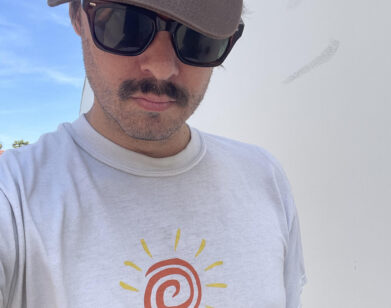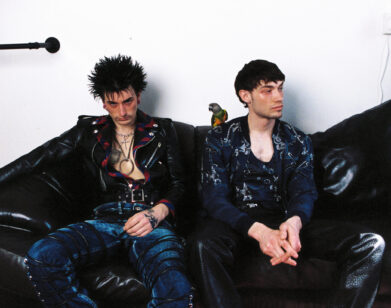Dan Bejar on Destroyer’s Ninth

DESTROYER’S DAN BEJAR. PHOTO COURTESY OF TED BOIS.
Already beloved by discerning indie-rock aficionados and other recalcitrant aesthetes, Destroyer’s ninth and latest release, Kaputt (Merge), has—perhaps inadvertently—encountered a larger audience thanks to the album’s quasi-ironic-sounding synth and sax-filled songs.
With each Destroyer album, the Vancouver, Canada-based Dan Bejar recruits a new set of collaborators, which has created a steady evolution of the band’s sound. What hasn’t changed is the unique quality of Bejar’s songwriting and his habit of overfilling songs with abstractly funny clusters of words over subtly catchy melodies. Never mind the Aja-esque flute solos—this is a guy who will write a late-night road-trip disco track about the artist Kara Walker. We chatted with him to inquire when the wordsmith becomes a songwriter.
KEN MILLER: You’ve been at this for well over a decade now. What, if anything, do you learn from one album to the next?
DAN BEJAR: I think I learn about the technical aspects of working in a studio, and maybe how different musicians operate in a studio. To me, this is huge—maybe the main thing, and still overwhelming. Actually, the more I think about an honest answer to this question, the more I’m confused and filled with dread by the process of record-making (though there is fun to be had, trust me). No album is a reaction to the last—I react to life, not albums. The idea of learning/evolving as a songwriter is an amazing concept, as realistic/fantastic as the idea of learning/evolving as a human being. I suppose part of it is, in life, we learn to pull the plug on bullshit. In an ideal world, anyway.
KEN MILLER: When you’re writing a song, do you begin with words or melodies?
DAN BEJAR: They definitely come all at once. What doesn’t come all at once is a chord structure, because I never sit down to play an instrument until it is absolutely necessary, and sometimes not even then. I hate chords and chord progressions these days. I gotta get over it.
KEN MILLER: To what degree are your lyrics free-associative—or do you try to write songs ‘about’ something?
DAN BEJAR: I write freely about many different things, one after the other. I’ve never tried to write a song, so I’ve never employed any kind of technique, like Bowie picking words out of a hat. Fuck that. Phrases come to me, like little gifts from somewhere, which I then mangle by trying to sing them into a microphone.
KEN MILLER: Are the non-words as important as the words?
DAN BEJAR: I’ve never sung gibberish, but I have sung my fair share of “dadadadadas” and “lalalalalalas.” I cut down on Kaputt, as I was hung up on trying to stay as invisible as possible inside the songs. If the non-words are on the side of music, then they are more important, because in this game, music always trumps words. More than anything, it’s the singing that makes or breaks you.
KEN MILLER: I feel like a lot of your music is about music and a lot of your writing is about writing. Is this at all accurate?
DAN BEJAR: I don’t think so. People like to talk about Destroyer—the people that like to talk about Destroyer, that is—as a running commentary on a running commentary. But I can’t bring myself to believe that that is true. There are so many loftier themes. Surely I’ve touched on at least one or two. I think maybe I like to set the stage for whatever drama used to unfold in Destroyer songs, and sometimes the scenery would involve a world where people were into making noise or painting a painting. But on Kaputt, all that feels like it’s changed. I seem to be speaking of very specific things, and I don’t know where they come from…. [It’s] the first time it’s ever happened to me!
KEN MILLER: When you sing about “the scene,” what do you mean? Does it mean the same thing to you now that it did 10 years ago?
DAN BEJAR: Ten years ago it meant whatever it was that took up my days. Now, for me anyway, it’s a term of pure fiction, or maybe a little wisp of a memory you have while hanging out in your sick bed or something you remember about yourself while roaming around the garden, watering the grass… I am removed from the word, is what I’m trying to say.
KEN MILLER: Fairly obviously, the instrumentation on this record is pretty different from the last few. What brought you back to using drum machines and synth?
DAN BEJAR: I wanted to be able to fuck around in the studio and build songs from nothing, then scrap them or change them on a whim. In the end, I think it is a decent meld of programmed drums and played drums. I wanted things to be vaguely danceable, but still casual, mid-tempo, not techno… I was also really hung up on the filigree of percussion—both programmed and played—on the album Avalon by Roxy Music. As for the synths, my initial idea for Kaputt was to eliminate all instruments with any kind of fast melodic attack. Then I wanted to create “synth”-like pads out of sax, trumpet and ambient guitar clusters. In the end, things took on a more groove-based life of their own, and the solo-ing got more muscular, so my “pleasant mush” idea kind of got ditched. But its spirit still lurks in there, somewhere.
KEN MILLER: People already really like your music a lot, but now it seems that a lot of people really like this album. You cool with that?
DAN BEJAR: If I am not cool with it, there are ways of taking care of it! Besides, I have complete confidence in Destroyer remaining obscure, if only slightly less so.
KAPUTT IS OUT NOW ON MERGE RECORDS, AND DESTROYER WILL TOUR THROUGHOUT MARCH AND APRIL. FOR MORE INFORMATION, VISIT DESTROYER’S WEBSITE.






